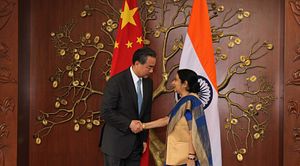Chinese Foreign Minister Wang Yi was in India last week at time when tensions are rising in Asia as China takes steps to assert its control over the waters of South China Sea after its claims were rejected by an international tribunal at the Hague last month. China’s Defense Minister Chang Wanquan, meanwhile, has called for a “people’s war at sea” to push back against threats to Chinese claims. In a speech last week, he warned of maritime security threats and called for increased preparations in order to “safeguard sovereignty.”
More significant are attempts by China to change its laws, with its Supreme Court saying that people caught illegally fishing in Chinese waters could be jailed for up to a year, thereby defining disputed waters as including the country’s exclusive economic zones.
Over the past few weeks, all three Chinese naval fleets have taken to the sea to practice for a “sudden, cruel, and short” conflict. Beijing has also begun to fly bomber and fighter aircraft near disputed islands in the South China Sea. It has also announced that it would hold joint naval drills in the waters with Russia in September, terming the drills “routine” and not directed at any third party. A group of new photographs have revealed the construction of several reinforced aircraft hangars at Fiery Cross, Subi, and Mischief Reefs, all land formations built up by China in recent months, on which the Chinese have also built runways.
China’s neighbors too aren’t keeping quiet. Reports have emerged of Vietnam secretly fortifying several of its islands in the disputed South China Sea with new mobile rocket launchers capable of striking China’s runways and military installations across the vital trade route. Japan filed a protest with Beijing over recently discovered radar equipment China secretly installed in a gas exploration platform close to disputed waters in the East China Sea. Japan is concerned that the radar could be a signal that China will begin using gas exploration platforms as military outposts.
India’s proactive stance on the South China Sea dispute has not gone down well in Beijing. Ahead of the Chinese Foreign Minister’s visit, Chinese state media warned India to avoid “unnecessary entanglement with China over the South China Sea debate” if New Delhi “wishes to create a good atmosphere for economic cooperation.” Terming that India and China are partners, not rivals, state-run Xinhua news agency has also suggested that the door for India’s admission into the NSG is “not tightly” closed and New Delhi should “fully comprehend” Beijing’s concerns over the disputed South China Sea.
Wang Yi’s visit was the first high-level visit between the two countries after China blocked India’s Nuclear Suppliers Group (NSG) membership bid at the plenary meeting of the 48-nation grouping in June on the grounds that it was not a signatory to the NPT. During his visit, Wang said it is up to India to decide on what position it wishes to take vis-a-vis the ongoing issue. His visit was largely aimed at laying the groundwork for Indian Prime Minister’s visit to China next month for the G-20 summit. Wang’s visit also came just days after Chinese troops “transgressed” the border on land and by air in Chamoli district of Uttarakhand last month. India-China bilateral trade which totaled around $70 billion last year tilted heavily in favor of Beijing with over a $46 billion trade deficit.
India and China will be engaging at the highest levels beginning with Indian Prime Minister’s visit to China to attend the G-20 summit in Hangzhou next month. Following the ruling by an international tribunal last month which rejected Beijing’s claims over much of the disputed sea area, China is campaigning against the issue to be raised in G20 Summit saying it is a matter to be resolved between parties concerned and outsider has no role. Chinese President Xi Jinping will also visit Goa for the coming BRICS summit scheduled for October.
Sino-Indian ties are looking vulnerable at the moment on a range of fronts. India is carefully assessing the implications of rapidly evolving maritime order in Asia for its own interests and engaging with Beijing accordingly. The stakes of what happens in the waters around South China Sea are as high for India as they are for the regional states. Global maritime order is under stress and China has done little to assuage concerns about its growing assertiveness. Regional states as well as India should now focus on making sure that China does not upend he regional balance of power to everyone’s disadvantage.

































